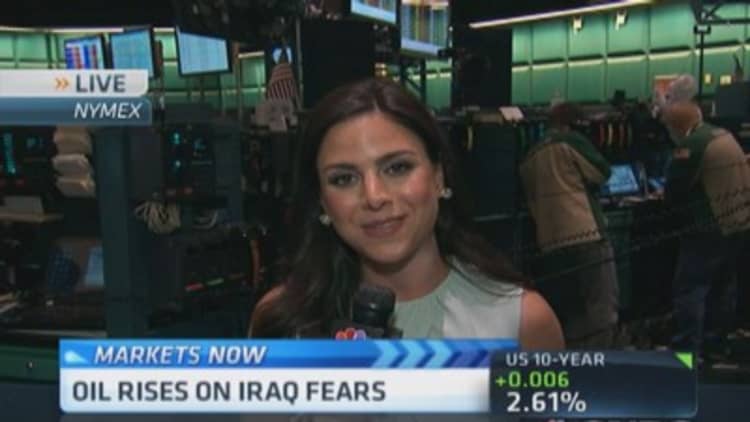Stock markets in the oil-rich Gulf continued to slide lower on Tuesday as investor sentiment was hit by the escalating violence in Iraq.
The losses were spearheaded by the Dubai Financial Market (DFM), a bellwether for how foreign investors perceive risks in the region, which has lost some 8 percent in the last three trading sessions. The index, which bounced back 0.6 percent in Tuesday trade, remains among the world's best performing benchmarks so far this year, having gained 32 percent.
Stocks in Qatar, Abu Dhabi and Dubai were officially included in the emerging market list by index compiler MSCI earlier this month. Other asset classes in the Gulf showed little signs of stress.
Read More How the collapse of Iraq would affect America
"Iraq needs to be watched very closely as has the potential to escalate to the wider region," Saleem Khokhar, Head of Equities at the National Bank of Abu Dhabi (NBAD) told CNBC. "Oil should act as a natural hedge for the region were matters to escalate, however, this would not be my main scenario".

Most chief executives and chairmen interviewed by CNBC's "Access: Middle East" in recent months had been positive about Iraq's political and economic prospects, having deployed labor and capital in an attempt to capitalize on the country's economic growth. The International Monetary Fund (IMF) forecast GDP to expand 5.9 percent gross doemstic product (GDP) in 2014, the fastest pace of expansion of any economy in the Middle East this year.
Much of the vast border between Iraq and its southern neighbors of Saudi Arabia and Kuwait is protected with a state-of-the-art fence set up in the aftermath of the deteriorating security conditions following the fall of Saddam Hussein.
Read More We're still operating in Iraq: BP CEO
Meanwhile, political reactions to the crisis in Iraq continued Tuesday, with the council of ministers in Saudi Arabia issuing a statement rejecting "foreign interference" in Iraq, squarely placing the blame for the crisis in the hands of the Iraqi authorities in Baghdad as a result of "sectarian and exclusionary policies". The council also urged the formation of a "national consensus government". Qatari Foreign Minister Khalid Al-Attiyah was reported by local media as criticizing the Iraqi central government for "pursuing policies based on narrow factional interests".
The rhetoric is markedly different from the Iranian political leadership, which has pledged its support for the Iraqi central government under incumbent Prime Minister Nuri Al-Maliki. Iran's Deputy Foreign Minister for Arab and African Affairs Hossein Amir-Abdollahian was quoted by Iran's state-run PressTV as saying they would assist as necessary in the "counter-terrorism campaign", but ruled out direct military intervention. He also denied any talks had already taken place with the United States.
Read More Oil spike fears rise as stability in Iraq unravels
"The Islamic Republic of Iran has had no negotiations with the Americans over mutual cooperation in Iraq," Amir-Abdollahian insisted.
The US is already sending 275 military personnel to safeguard its embassy in Baghdad, the largest diplomatic post in the world.
Follow us on Twitter: @CNBCWorld

